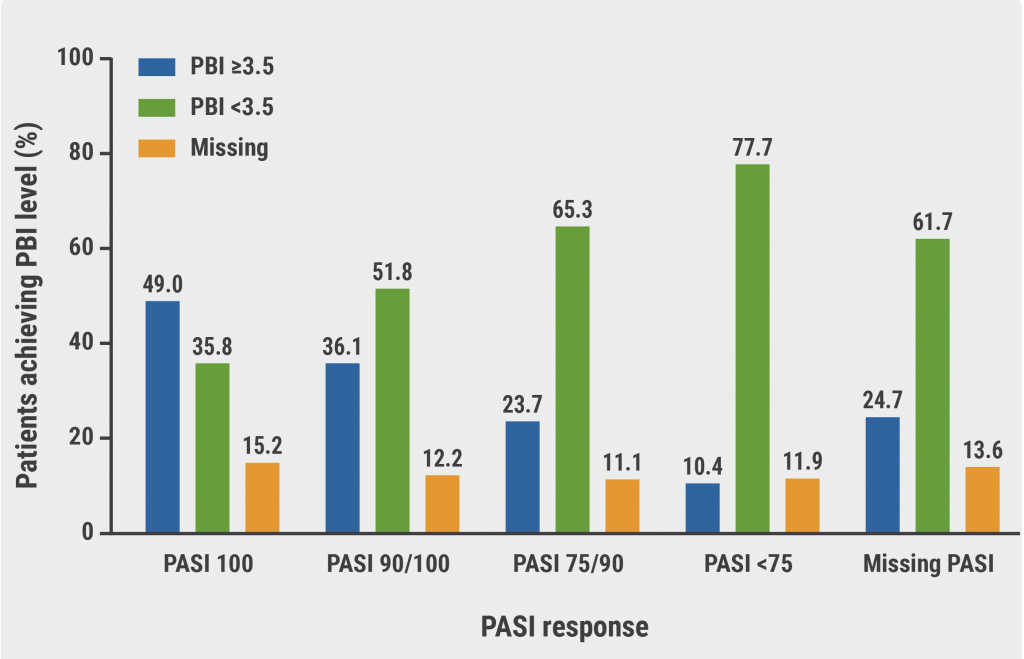In patients with long-term use of biologics and stable treatment response, the question often arises of a possible dose reduction. “In a recent questionnaire study that we performed with the International Psoriasis Council, we found that 70% of psoriasis experts already perform dose reductions,” Dr Juul van den Reek (Radboud University Medical Center, the Netherlands) said [1]. The main reasons for doing so were the implicated reduction of costs (87%) and increased patient safety (43%), as well as requests by the patients themselves (41%). Those who chose not to reduce dosages were concerned about the lack of evidence (94%), psoriasis exacerbations (56%), and immunogenicity issues in terms of anti-drug antibodies (53%).
The phase 4, randomised, non-inferiority CONDOR study (NCT02602925) demonstrated that 53% of psoriasis patients with prior stable and low disease activity successfully tapered their dosage of biologic treatment with adalimumab, etanercept, or ustekinumab at 12 months. The current sub-study investigated serum drug levels and anti-drug antibodies in patients with drug reduction versus routine care and attempted to identify variables to predict successful dose tapering. The CONDOR sub-study consisted of 118 patients who either reduced dosing or continued with usual care. Blood samples were collected every 3 months, preferably at trough moments, i.e. just before administering the next dose of medication. Anti-drug antibodies were analysed for adalimumab and ustekinumab only, as antibodies for etanercept are considered rare and non-neutralising.
Interestingly, the baseline drug levels demonstrated great variance. “So, even with extremely low drug levels, some patients had very low disease activity,” Dr van den Reek pointed out. In all 3 drug reduction groups, drug levels were significantly lowered compared with the usual care arms after 3 months of drug reduction. Participants in the drug reduction group on adalimumab did not develop significantly more anti-drug antibodies than those on the normal dosage of the agent (P values for group comparison 0.33–0.76 at different time-points). Of note, 1 patient had a seroconversion from anti-drug antibodies-negative to anti-drug antibodies-positive, as did 2 patients in the usual care arm.
“Looking at the results of ustekinumab, no detectable anti-drug antibodies were seen at baseline, nor throughout the study, not in the dose reduction nor the usual care group, so there is also no difference between those groups,” Dr van den Reek stated. Thus, the multivariate regression set up to identify variables of prediction of successful dose reduction was inconclusive. Given the heterogeneity of baseline drug levels, no clarification could be given on how to predict beneficial dose reduction versus failure.
“Most importantly, there was no sign of increased anti-drug antibody formation, and although groups were small, based on this study, it is highly questionable whether fear for anti-drug antibody formation should be a barrier to apply dose reduction in practice,” Dr van den Reek stressed in her conclusion.
- van den Reek J. Serum drug levels and anti-drug antibodies in the context of dose tapering by interval prolongation of adalimumab, etanercept and ustekinumab in patients with psoriasis: results of the randomised controlled CONDOR trial. FC30, Psoriasis from Gene to Clinic 2021, 9–11 December.
Copyright ©2021 Medicom Medical Publishers
Posted on
Previous Article
« Intermediate monocytes are possible predictors of response to secukinumab Next Article
Risankizumab superior to ustekinumab in skin histopathology scores »
« Intermediate monocytes are possible predictors of response to secukinumab Next Article
Risankizumab superior to ustekinumab in skin histopathology scores »
Table of Contents: PFGC 2021
Featured articles
Letter from the Editor
Guselkumab shows highest drug survival among systemic treatments
Genes in Psoriasis and Psoriatic Arthritis
HLA-C*06:02-positive patients on ustekinumab show higher drug survival in a real-world scenario
Protective factors identified against anti-drug antibody formation to adalimumab in psoriasis
Comorbidity in Psoriasis
Psoriasis associated with a higher cancer risk
Comorbidity and clinical features of psoriasis vary according to HLA-C*06:02 status
Psoriasis patients with cardiovascular comorbidity characterised by high systemic inflammation
Psoriasis Therapy: New Findings
Inhibition of heat shock protein: A novel way to treat psoriasis?
Guselkumab shows highest drug survival among systemic treatments
Tapering biologics: No alarming signs of increased anti-drug antibodies
Intermediate monocytes are possible predictors of response to secukinumab
Gut microbiota of psoriasis patients: less diverse and reduced functionality
COVID-19: What's New
DLQI scores underestimated during lockdowns?
TNF blockers likely beneficial for psoriatic patients with COVID-19
Patients on immunomodulators need 2 COVID-19 vaccinations before seroconversion
Paradoxical Reactions to Biologics
The Yin and Yang of opposing vectors: an explanation for side effects of biologics
Explaining arthropathy development through IL-4 and IL-13 blockade
Best of the Posters
Potential biomarker discovered for treatment response to ustekinumab
TNF inhibitor for immune-mediated inflammatory disease doubles the risk of paradoxical psoriasis
Secukinumab also tolerable in paediatric psoriasis patients
High treatment success with ixekizumab in patients with psoriasis and diabetes
© 2024 Medicom Medical Publishers. All rights reserved. Terms and Conditions | Privacy Policy


